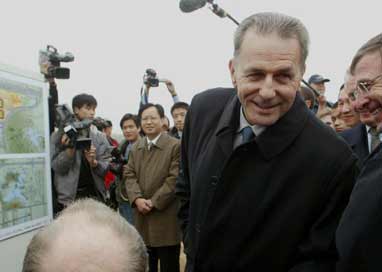|
Foreigners see no bonanza in Beijing Olympics
(AP)
Updated: 2005-11-04 09:48
Beijing's spending bonanza for the 2008 Olympics is proving a disappointment
to foreign companies, who say they are being effectively locked out of most
contracts.
With China allocating billions of dollars to the Games, the frustration among
foreigners over so far scant opportunities, voiced privately for months, broke
out in the open in October. A senior executive with General Electric Co., in
published remarks, criticized the bidding process as opaque and skewed toward
domestic firms.

International Olympic Committee
(IOC) President Jacques Rogge visits the construction site of Beijing
Olympic venues, October 30, 2004. He spoke highly of Beijing's
preparations for the 2008 Olympic Games.
[newsphoto] |
"The authorities are
currently unable to ensure that the bidding process is fair," the American
Chamber of Commerce-China's monthly magazine quoted Li Jianbo, in charge of GE's
relations with the Chinese government, as saying.
Both the city government office in charge of Olympic construction and the
Beijing Olympic organizing committee have promised that bidding would fair and
open and that foreigners would be welcome.
The two agencies didn't immediately respond to requests for comment.
Foreigners have not been completely excluded, though U.S. officials said no
American company has won a sizable contract.
Australian and European architects are designing several venues, including
for the 3.1 billion yuan National Stadium, the Games' signature architectural
work.
London-based Ove Arup & Partners is providing design, engineering and
project management services for a handful of venues and related infrastructure
projects.
But the foreign share pales in comparison with the huge sums involved: China
is spending US$2.4 billion on Olympic venues alone and another US$35
billion-US$40 billion on remaking the city for 2008. Projects range from new
power, water and sewage treatment plants to the world's largest airport
terminal.
"The bidding process is a nightmare," said a foreign consultant who is trying
to land Olympic-related contracts for European companies complained that anyone
who wasn't an insider didn't know what was going on. The consultant requested
anonymity so as not to jeopardize his already limited chances of business
success here.
Big companies have staffs to gather information on bidding, but have only
about 1 percent of the information that they need, the consultant said.
Part of the frustrations stem from years-long trade frictions.
Three years ago, Beijing raised the bar for foreign participation in
construction projects, requiring foreign construction firms to set up local
entities and foreign architects to work with local partners. That has helped
keep most major Olympic contracting in the hands of state-run Chinese
construction companies, executives with foreign companies say.
But a larger part of the foreign criticisms are directed at the often close
relationship between Chinese business and government and the resulting disregard
for regulation and standard practices.
Although China has laws and rules for government procurement and bidding,
foreign executives said that much Olympic contracting is governed by neither.
For infrastructure projects -- a water treatment plant, for example _
government ministries issue separate regulations, the executives said.
For an Olympic equestrian center initially planned for the Beijing suburbs,
bidding was organized by invitation only.
The GE executive's criticisms took aim at these connections. In the article,
Li said that bidding standards were being manipulated to exclude certain
companies and that relationships seemed to be influencing outcomes.
"Bidding and tendering standards should be generic, open to the general
public and incorporate international practices," Li was quoted as saying.
Li confirmed that the reported remarks were accurate but declined to
elaborate, referring inquiries about GE's Olympic contracting to company
spokesman Geoff Li.
"There is nothing significant we've won on Olympic projects so far," said Li,
the spokesman.
GE's fate is seen by other foreign Olympic business hopefuls as a bellwether.
The company is one of a select group of global sponsors of the Olympics. Its
advertisements -- for everything from electric power to water treatment -- are
plastered all over Beijing.
|